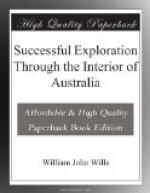. . .
On the 19th, camped again without water, on the sandy bed of the creek, having been followed by a lot of natives who were desirous of our company; but as we preferred camping alone, we were compelled to move on until rather late, in order to get away from them. The night was very cold. A strong breeze was blowing from the south, which made the fire so irregular that, as on the two previous nights, it was impossible to keep up a fair temperature. Our general course throughout the day had been south-south-east.
. . .
On Sunday, April 21, the survivors, Mr. Burke, my son, King, and two camels, reached Cooper’s Creek at the exact place where the depot party had been left under Brahe. There was no one there! During the last few days every exertion had been made, every nerve strained to reach the goal of their arduous labours—the spot where they expected to find rest, clothing, and provisions in abundance. King describes in vivid language the exertions of that last ride of thirty miles; and Burke’s delight when he thought he saw the depot camp; “There they are!” he exclaimed; “I see them!” The wish was “father to the thought.” Lost and bewildered in amazement, he appeared like one stupefied when the appalling truth burst on him. King has often described to me the scene. “Mr. Wills looked about him in all directions. Presently he said, ‘King, they are gone;’ pointing a short way off to a spot, ’there are the things they have left.’ Then he and I set to work to dig them up, which we did in a short time. Mr. Burke at first was quite overwhelmed, and flung himself on the ground.” But soon recovering, they all three set to work to cook some victuals. When thus refreshed, my son made the following entry in his journal:
Sunday, April 21.—Arrived at the depot this evening, just in time to find it deserted. A note left in the plant by Brahe communicates the pleasing information that they have started today for the Darling; their camels and horses all well and in good condition. We and our camels being just done up, and scarcely able to reach the depot, have very little chance of overtaking them. Brahe has fortunately left us ample provisions to take us to the bounds of civilization namely:—Flour, 50 pounds; rice, 20 pounds; oatmeal, 60 pounds; sugar, 60 pounds; and dried meat, 15 pounds. These provisions, together with a few horse-shoes and nails, and some odds and ends, constitute all the articles left, and place us in a very awkward position in respect to clothing. Our disappointment at finding the depot deserted may easily be imagined;—returning in an exhausted state, after four months of the severest travelling and privation, our legs almost paralyzed, so that each of us found it a most trying task only to walk a few yards. Such a leg-bound feeling I never before experienced, and hope I never shall again. The exertion required to get up a slight




